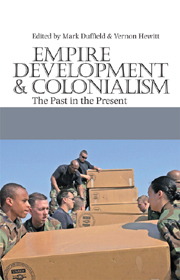Book contents
- Frontmatter
- Contents
- Acknowledgements
- Notes on Contributors
- Introduction
- 1 The Exceptional inclusion of ‘Savages’ & ‘Barbarians’
- 2 Empire, International Development & the Concept of Good Government
- 3 Empire: a Question of Hearts?
- 4 ‘Conflict-Sensitive’ Aid & Making liberal Peace
- 5 Development, Poverty & Famines
- 6 Plain Tales from the Reconstruction Site
- 7 The International Politics of Social Transformation
- 8 Liberal Interventionism & the Fragile State
- 9 Freedom, Fear & NGOs
- 10 Theorising Continuities between Empire & Development
- 11 Spatial Practices & Imaginaries
- 12 Decolonising the Borders in Sudan
- 13 ‘Individualism is, Indeed, Running Riot’
- Index
3 - Empire: a Question of Hearts?
The Social Turn in Colonial Government Bombay c. 1905–1925
Published online by Cambridge University Press: 05 February 2013
- Frontmatter
- Contents
- Acknowledgements
- Notes on Contributors
- Introduction
- 1 The Exceptional inclusion of ‘Savages’ & ‘Barbarians’
- 2 Empire, International Development & the Concept of Good Government
- 3 Empire: a Question of Hearts?
- 4 ‘Conflict-Sensitive’ Aid & Making liberal Peace
- 5 Development, Poverty & Famines
- 6 Plain Tales from the Reconstruction Site
- 7 The International Politics of Social Transformation
- 8 Liberal Interventionism & the Fragile State
- 9 Freedom, Fear & NGOs
- 10 Theorising Continuities between Empire & Development
- 11 Spatial Practices & Imaginaries
- 12 Decolonising the Borders in Sudan
- 13 ‘Individualism is, Indeed, Running Riot’
- Index
Summary
Introduction
By the turn of the twentieth century, British colonial government in Bombay became serious about sustaining the life of its subjected population, rather than treating it with indifference. The shift was not clear-cut. But the records produced by British administrators and their Indian colleagues tell of an emerging social sensibility and a growing concern over social conditions. This concern stuck with colonial state discourse up until a more repressive agenda began to sideline it by the mid-1920s. So, at this juncture, not at all brief in time, colonial officials in Bombay began to use a social vocabulary, engage social projects, and implement socially informed legislation. They did so as they grappled with how to govern a modern, yet colonial, industrial society. They did not, however, believe in political self-government and freedom for the Indians. Among administrators in Bombay, and in the British empire more generally, colonial government was not in question. On the contrary: empire was still seen as the best way to organise India's inter-national and domestic political and commercial relations.
Yet slowly, under the period here under review, views of the imperial connection with India were being rethought by some of those thinking about the working of the colonial state. In their view, social reform under colonial rule could enhance progress in India. And sifting through the archives produced at this time, reveals that colonial governments now began elaborating agendas of state-guided reform of the social environment, manifested by programmes of housing, sanitation and primary education.
- Type
- Chapter
- Information
- Empire, Development and ColonialismThe Past in the Present, pp. 45 - 58Publisher: Boydell & BrewerPrint publication year: 2009



